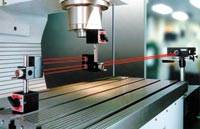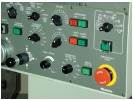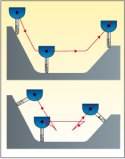CNC & Machine Controls
Probing For Process Improvement
Advances in machine accuracy and probing technology make on-machine inspection a powerful tool for automating and speeding part processing.
Read MoreMachining Services Contractor Runs Smoother Operation With CNC Program
See how his contractor switched to MultiDNC to eliminate the use of laptops and provide daily backup of all CNC programs.
Read MoreShifting Program Zero On Machining Centers
It is common to machine several identical workpiece attributes from within a single program. Consider the four identical circular counter-bored holes that must be milled in the workpiece shown in Figure 1.
Read MoreInventing Wear Offset Compensation
You know that machining centers have tool length compensation, cutter radius compensation and fixture offsets. Turning centers have geometry offsets, wear offsets and tool nose radius compensation.
Read MoreLaser Calibration System Verifies Linear And Circular CNC Accuracy
How do you document that your CNC machine tool is within tolerance? That's becoming a very familiar question as more and more companies implement quality assurance programs, such as ISO 9000, TQM and predictive maintenance.
Read MoreCombination Machines Changing The Toolroom
There's a relatively quiet but relentless change in metalworking toolroom equipment. Handwheels are still there, so manual operation is preserved, but now there is the capacity to operate these machines automatically via CNC or using a combination of manual and CNC. Timing for this additional flexibility is perfect.
Read MoreAll-Digital Upgrade Starts At The Low End
An all-digital control package will soon be standard on many machining center models from Cincinnati Machine (Cincinnati, Ohio). For now, the technology is standard on the "Arrow" line of vertical machining centers. Cincinnati didn't begin the upgrade with its high-end machines, but instead with its lowest-cost VMC family.
Read MoreFive-Axis Machining For The Masses
Control technology continues to make five-axis machining easier to use. Many special considerations - particularly qualified tools for pivoting-spindle machines - are no longer essential to the process.
Read MoreA Flexible Turret Index Position
The cutting tools in your turning centers change on a regular basis. To minimize tool change time during setups, many setup people will simply load the tools required for the new job and leave tools in the turret from the last job as long as they don't interfere with the new job.
Read MoreCombining Absolute And Incremental Motions
While we agree that the absolute mode should be your positioning mode of choice for most applications, there are times when incremental mode can be quite helpful. Repeating motions within a subprogram, for example, is one excellent example.
Read More










.jpg;maxWidth=300;quality=90)

